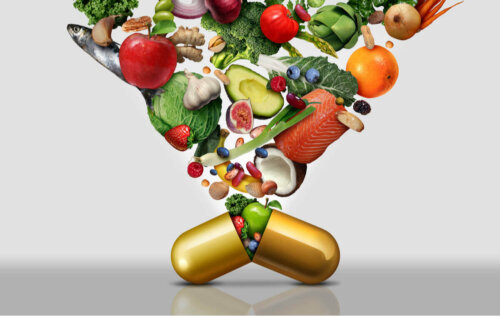The Essential Vitamins Your Dog Needs

There are several myths about pet diets, especially in regard to which vitamins are essential for them. As you may already know, there’s a great variety of dog food and supplements at the grocery stores.
However, each pet is unique and their diet may need more of some nutrients than others. So continue reading as we’re going to discuss the importance of vitamins in your dog’s diet.
Essential vitamins for dogs
Living beings, specifically animals, require a diet with high nutritional quality. It must contain water, carbohydrates, proteins, lipids, minerals, and vitamins. All these nutrients are indispensable in the feeding of these animals and today we’re only going to discuss vitamins.
A little bit of history
As you may already know, dogs descend from primitive wolves, ancestors that ate fresh meat by cutting the tissues of their prey. They completely consumed their prey and wasted nothing, at least that’s what we think.
Later, their diet changed with the process of domestication of canids by humans. This involved physiological variations after thousands of years of evolution and adaptation.
When comparing the genome of wolves and dogs, there are some perceived structural differences. There have been modifications of fat metabolism and starch digestion at the feeding level.
In other words, dogs have been lowering their consumption of meat throughout their evolution. Thus, you must be careful with your animal’s diet because the wrong idea about their feeding habits could lead to nutritional imbalances.
As you can imagine, a complete and balanced feeding supposes the contribution of suitable amounts of all essential nutrients. Vitamins, for one.

What are the essential vitamins?
Vitamins are food components that intervene in a multitude of biological processes. A deficiency or excess can lead to serious problems. However, the body doesn’t produce them, despite them being so necessary. In fact, the body does produce vitamin K and D but in insufficient quantities for the body.
This implies that vitamins must be acquired from external sources through a balanced diet. However, all these vitamins may either be present as water-soluble (B, C) or fat-soluble (A, D, E, K).
Types of essential vitamins
As we mentioned above, vitamins are organic molecules that act as essential enzymes in the processes of the organism. However, each animal species needs a higher concentration of some vitamins than others.
For example, vitamins that are essential for dogs aren’t essential for cats. Continue reading to find out what vitamins are essential in a dog’s diet.
Retinol or vitamin A
This type of vitamin plays a key role in protecting the eyes, as well as in growth. Also, it helps the animal to deter infectious microorganisms. The types of food that are rich in vitamin A or its precursors and that you must include in your furry friend’s diet are:
- Liver and fish liver oils
- Egg yolk
- Fruit
- Green leaf vegetables
- Vegetables
Vitamins of the B complex are essential
Nature contains nine different vitamins that comprise the B-complex. These compounds intervene in the energy of the metabolism, as well as in cellular multiplication and the consequent synthesis of tissues of the organism.
Ascorbic acid or vitamin C
This vitamin has an important role in the production of collagen, the main component of connective tissue. Also, most organisms generate it but some animal species don’t, including humans.
Dogs can synthesize it on their own and this is why their diet doesn’t have to incorporate food that contains it.
Vitamin E
This vitamin plays an indispensable role in the body’s defense. Therefore, one must obtain it through food sources such as vegetable oils, cereals, and nuts.
Cholecalciferol or Vitamin D
The body produces this vitamin when exposed to the sun over a certain period of time. However, you must also incorporate it through the diet by consuming:
- Eggs
- Bluefish (salmon or mackerel)
- Fish liver oil
These types of food can restore the levels of vitamin D required by the body. This nutrient, along with calcium, helps maintain the nervous system.
Vitamin K
This vitamin is involved in blood clotting processes and is produced by bacteria in the body. You don’t have to include it in your animal’s diet unless a vet prescribes it.

In conclusion, vitamins are essential in a dog’s diet even if only in small quantities as they play an important role in body processes. Finally, consult the vet for any changes in an animal’s diet. This is because only they can determine the most appropriate diet for a pet.
There are several myths about pet diets, especially in regard to which vitamins are essential for them. As you may already know, there’s a great variety of dog food and supplements at the grocery stores.
However, each pet is unique and their diet may need more of some nutrients than others. So continue reading as we’re going to discuss the importance of vitamins in your dog’s diet.
Essential vitamins for dogs
Living beings, specifically animals, require a diet with high nutritional quality. It must contain water, carbohydrates, proteins, lipids, minerals, and vitamins. All these nutrients are indispensable in the feeding of these animals and today we’re only going to discuss vitamins.
A little bit of history
As you may already know, dogs descend from primitive wolves, ancestors that ate fresh meat by cutting the tissues of their prey. They completely consumed their prey and wasted nothing, at least that’s what we think.
Later, their diet changed with the process of domestication of canids by humans. This involved physiological variations after thousands of years of evolution and adaptation.
When comparing the genome of wolves and dogs, there are some perceived structural differences. There have been modifications of fat metabolism and starch digestion at the feeding level.
In other words, dogs have been lowering their consumption of meat throughout their evolution. Thus, you must be careful with your animal’s diet because the wrong idea about their feeding habits could lead to nutritional imbalances.
As you can imagine, a complete and balanced feeding supposes the contribution of suitable amounts of all essential nutrients. Vitamins, for one.

What are the essential vitamins?
Vitamins are food components that intervene in a multitude of biological processes. A deficiency or excess can lead to serious problems. However, the body doesn’t produce them, despite them being so necessary. In fact, the body does produce vitamin K and D but in insufficient quantities for the body.
This implies that vitamins must be acquired from external sources through a balanced diet. However, all these vitamins may either be present as water-soluble (B, C) or fat-soluble (A, D, E, K).
Types of essential vitamins
As we mentioned above, vitamins are organic molecules that act as essential enzymes in the processes of the organism. However, each animal species needs a higher concentration of some vitamins than others.
For example, vitamins that are essential for dogs aren’t essential for cats. Continue reading to find out what vitamins are essential in a dog’s diet.
Retinol or vitamin A
This type of vitamin plays a key role in protecting the eyes, as well as in growth. Also, it helps the animal to deter infectious microorganisms. The types of food that are rich in vitamin A or its precursors and that you must include in your furry friend’s diet are:
- Liver and fish liver oils
- Egg yolk
- Fruit
- Green leaf vegetables
- Vegetables
Vitamins of the B complex are essential
Nature contains nine different vitamins that comprise the B-complex. These compounds intervene in the energy of the metabolism, as well as in cellular multiplication and the consequent synthesis of tissues of the organism.
Ascorbic acid or vitamin C
This vitamin has an important role in the production of collagen, the main component of connective tissue. Also, most organisms generate it but some animal species don’t, including humans.
Dogs can synthesize it on their own and this is why their diet doesn’t have to incorporate food that contains it.
Vitamin E
This vitamin plays an indispensable role in the body’s defense. Therefore, one must obtain it through food sources such as vegetable oils, cereals, and nuts.
Cholecalciferol or Vitamin D
The body produces this vitamin when exposed to the sun over a certain period of time. However, you must also incorporate it through the diet by consuming:
- Eggs
- Bluefish (salmon or mackerel)
- Fish liver oil
These types of food can restore the levels of vitamin D required by the body. This nutrient, along with calcium, helps maintain the nervous system.
Vitamin K
This vitamin is involved in blood clotting processes and is produced by bacteria in the body. You don’t have to include it in your animal’s diet unless a vet prescribes it.

In conclusion, vitamins are essential in a dog’s diet even if only in small quantities as they play an important role in body processes. Finally, consult the vet for any changes in an animal’s diet. This is because only they can determine the most appropriate diet for a pet.
All cited sources were thoroughly reviewed by our team to ensure their quality, reliability, currency, and validity. The bibliography of this article was considered reliable and of academic or scientific accuracy.
- Mitos y dietas alternativas en perros y gatos. Revisión sobre sus efectos y recomendaciones. Universidad Católica de Valencia. Recogido a 6 de septiembre de 2020 en: https://riucv.ucv.es/bitstream/handle/20.500.12466/58/Mara_Sillero_Vizcaino_pdf.pdf?sequence=1&isAllowed=y
- Conceptos básicos de nutrición en perros y gatos, CVPBA. Recogido a 6 de septiembre de 2020 en: https://ri.conicet.gov.ar/bitstream/handle/11336/53482/CONICET_Digital_Nro.d26d43e9-7be4-40f6-84b0-e44797b2d9d0_B-29-36.pdf?sequence=5&isAllowed=y
This text is provided for informational purposes only and does not replace consultation with a professional. If in doubt, consult your specialist.








